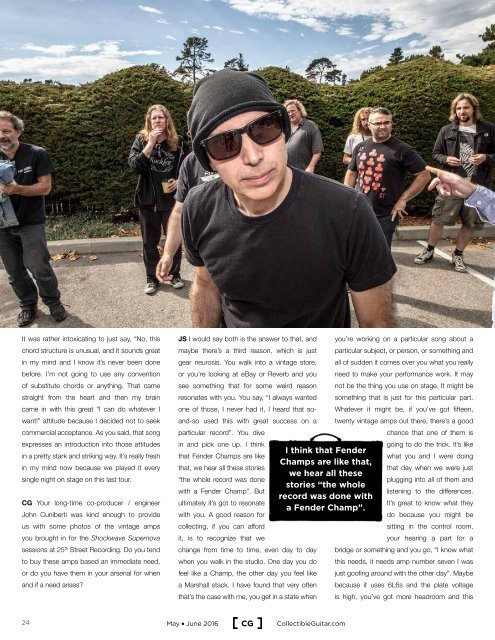CG-MayJun16-ISSUU
Create successful ePaper yourself
Turn your PDF publications into a flip-book with our unique Google optimized e-Paper software.
It was rather intoxicating to just say, “No, this<br />
chord structure is unusual, and it sounds great<br />
in my mind and I know it’s never been done<br />
before. I’m not going to use any convention<br />
of substitute chords or anything. That came<br />
straight from the heart and then my brain<br />
came in with this great “I can do whatever I<br />
want!” attitude because I decided not to seek<br />
commercial acceptance. As you said, that song<br />
expresses an introduction into those attitudes<br />
in a pretty stark and striking way. It’s really fresh<br />
in my mind now because we played it every<br />
single night on stage on this last tour.<br />
<strong>CG</strong> Your long-time co-producer / engineer<br />
John Cuniberti was kind enough to provide<br />
us with some photos of the vintage amps<br />
you brought in for the Shockwave Supernova<br />
sessions at 25 th Street Recording. Do you tend<br />
to buy these amps based an immediate need,<br />
or do you have them in your arsenal for when<br />
and if a need arises?<br />
JS I would say both is the answer to that, and<br />
maybe there’s a third reason, which is just<br />
gear neurosis. You walk into a vintage store,<br />
or you’re looking at eBay or Reverb and you<br />
see something that for some weird reason<br />
resonates with you. You say, “I always wanted<br />
one of those, I never had it, I heard that soand-so<br />
used this with great success on a<br />
particular record”. You dive<br />
in and pick one up. I think<br />
that Fender Champs are like<br />
that, we hear all these stories<br />
“the whole record was done<br />
with a Fender Champ”. But<br />
ultimately it’s got to resonate<br />
with you. A good reason for<br />
collecting, if you can afford<br />
it, is to recognize that we<br />
change from time to time, even day to day<br />
when you walk in the studio. One day you do<br />
feel like a Champ, the other day you feel like<br />
a Marshall stack. I have found that very often<br />
that’s the case with me, you get in a state when<br />
I think that Fender<br />
Champs are like that,<br />
we hear all these<br />
stories “the whole<br />
record was done with<br />
a Fender Champ”.<br />
you’re working on a particular song about a<br />
particular subject, or person, or something and<br />
all of sudden it comes over you what you really<br />
need to make your performance work. It may<br />
not be the thing you use on stage. It might be<br />
something that is just for this particular part.<br />
Whatever it might be, if you’ve got fifteen,<br />
twenty vintage amps out there, there’s a good<br />
chance that one of them is<br />
going to do the trick. It’s like<br />
what you and I were doing<br />
that day when we were just<br />
plugging into all of them and<br />
listening to the differences.<br />
It’s great to know what they<br />
do because you might be<br />
sitting in the control room,<br />
your hearing a part for a<br />
bridge or something and you go, “I know what<br />
this needs, it needs amp number seven I was<br />
just goofing around with the other day”. Maybe<br />
because it uses 6L6s and the plate voltage<br />
is high, you’ve got more headroom and this<br />
24 May June 2016<br />
CollectibleGuitar.com


